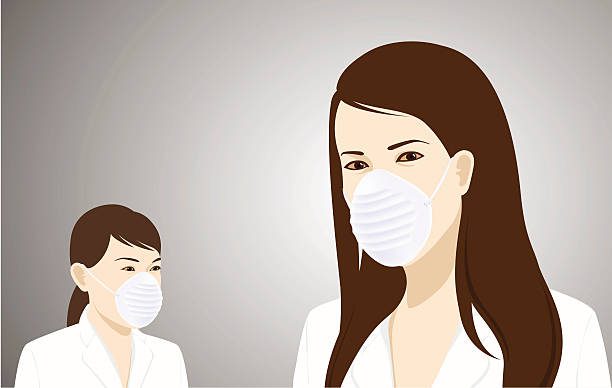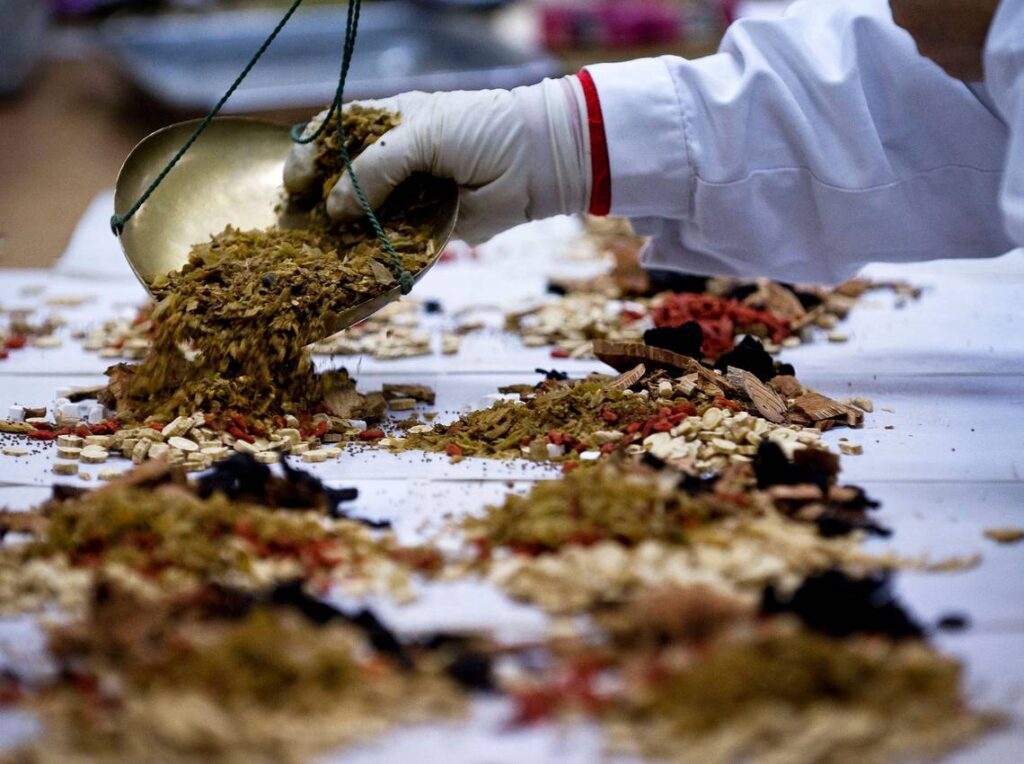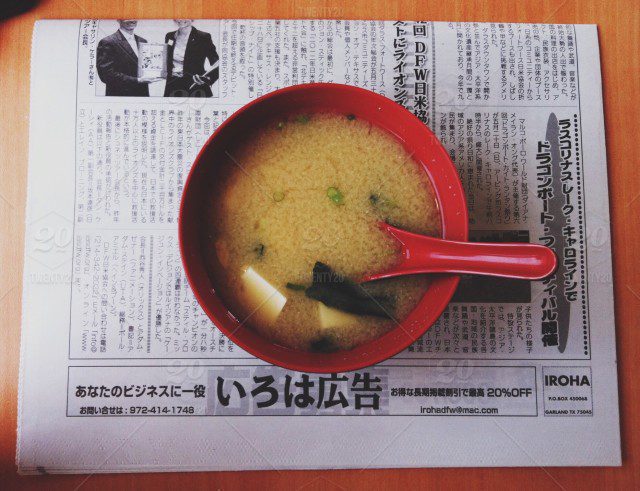
The cold and flu season is in full swing. For some of us, getting the flu means a couple of weeks out of work or school, and then life goes back to normal. But the flu can be serious, even deadly if you have health conditions like asthma, heart disease, diabetes, or a weakened or compromised immune system. The elderly and children should also be watched closely when they have the flu.
In this article, I will explain how and why Chinese Medicine works for the treatment of viruses and the flu, or if you are someone who tends to get sick easily and frequently throughout the year. I’ll also give you tips on how to avoid getting sick. Hang on until the end of the article for recipes and nutrition advice to keep you healthy and/or to nurse you back to health if you are currently under the weather.
The best way to avoid the flu is the refined trick of not getting sick in the first place.
Some Basics
You can try to avoid sick people, but that’s not always easy to do, especially when you’re in close quarters like movie theaters or using public transportation. If you can’t steer clear of the virus, at least use good hygiene to create a barrier against flu germs.
- Wash your hands with warm water and soap every time you shake hands or touch a surface that might be germ-covered. Be sure to rub your hands together when you wash them, and not just apply soap and rinse. It’s the friction that cleans your skin, not just the soap.
- Carry an alcohol-based hand sanitizer with you for times when you can’t get to a sink.
- Bring along disinfectant wipes to clean any surfaces you’re about to touch.
- Take extra care not to touch your mouth, eyes, or nose without washing your hands first.
Sharing is wonderful, but not during flu season. Be stingy with your utensils, plates, glasses, and anything else you touch with your mouth. Wash used dishes and utensils in the dishwasher or in the sink with hot water and soap.
Take Care of Yourself
If you want your immune system to be in good enough shape to fight off the flu and other germs, you need to stay healthy. All these will give your body the strength it needs to fend off an influenza attack.
- Eat a balanced diet.
- Incorporate foods that build immunity.
- Exercise at least four days a week.
- Get 7 to 9 hours of sleep a night.
- Build up your immune system before the flu season starts or during it if you missed that window.
- Get regular acupuncture treatments.
- Take an herbal formula prescribed by your DOM to build your constitution and immunity.
- Dress for the weather and cover your neck; wear a hat when your hair is wet; dress warmly in the cold, etc.
If you do come down with the flu this season, look out for others. You can spread it for up to a week after you get sick. Don’t share germs with your friends, family, and co-workers.
- Stay home until you feel better and your fever has been gone (without the help of medicine) for at least 24 hours.
- Sneeze into your elbow, not your hand. That way, you can’t pass it around.
- Toss used tissues after you blow your nose. Don’t leave them lying around for someone else to find.
Build a Germ Barrier
It’s easy to catch the flu. When a nearby sick person sneezes or coughs, they send out a spray of virus-laden droplets straight to your open mouth or nose. You can also pick it up by touching a surface, like a restaurant table where a sick person dined before you. Flu germs can linger on places like tables, counters, desks, doorknobs, and faucets for up to 8 hours.
When you touch a germy surface and put your hands on your eyes, nose, or mouth, your fingers bring the virus right into your body.
Chinese Medicine’s Understanding of Colds and Flu
In some respects, the fundamental understanding of Chinese medicine is no different than that of Western medicine. For example, both systems agree that colds and flu occur from an external pathogen entering the body. However, within the Chinese medicine paradigm, this etiology must be understood within the context of the individual’s constitution.
Anything that weakens one’s resistance (overwork, not sleeping, eating poorly, health conditions, etc.) can weaken one’s immune system and allow a pathogen to attack and enter, causing disease.
Furthermore, the patient’s constitution (underlying pattern) coupled with the nature of the pathogen that is attacking will determine what symptoms and how the cold and flu will present in that given individual. We all have seen two people get the same cold and have completely different symptoms. This occurs precisely because of this interaction. This is fundamental to Chinese medicine’s viewpoint and plays a crucial role not only in treatment but also in the prevention of colds and flu.
Read More about Custom Chinese Herbal Prescriptions
Prevention of Colds and Flus
Because of the complexity of each individual, there is no one supplement that can be recommended for the prevention of colds and flu. There are many single herbs, e.g., such as Astragalus (Huang Qi), that are touted to have this effect and to be “immune-boosting.” This is not necessarily incorrect; however, there are a few problems with this type of thinking that must be understood in the context of Chinese medicine theory.
- Chinese herbs are rarely given in isolation, as single medicines, but rather in synergistic combinations.
- More importantly, even if a herb is given in isolation and is known to be a great “immune booster,” it may be completely inappropriate for one person and extremely appropriate for another person. For example, many people will develop problems and, hence, weaken their immune system if Astragalus (Huang Qi) is given. Understanding this is the art and hallmark of Chinese medicine.
The ability to diagnose the individual and come up with a treatment strategy that fits that person’s underlying imbalance is paramount to boosting one’s immune system, rather than simply picking a medicine that has a Western function of “boosting the immune system.”
Consequently, any formula or treatment strategy that can address underlying imbalances (strengthen deficiencies and/or eliminate excess pathogens/toxins from the body) will, in turn, allow the body’s immune system to work optimally, thereby strengthening it. Therefore, recommending any single herb or strategy for the general population is not optimal, although it may help a certain percentage of people.
Addressing the whole person’s constitution is essential to unraveling why patients frequently get sick. Consequently, such patients routinely report that they get sick less often, and when they get sick, it occurs for a shorter period of time when they are treated by Doctors of Oriental Medicine (DOMs).
Treatment of Colds and Flu
Chinese medicine and Western medicine agree on some fundamental ideas about why colds and flu occur. However, the treatment strategies are drastically different between the two. First and foremost, Chinese medicine treats every cold and flu case differently. Chinese medicine takes a very proactive role in eliminating the pathogen and resolving the disease process, drastically shortening the time one is sick.
Chinese medicine, even when there is a bacterial infection, always employs strategies to push out the pathogen and not just “kill it.” This unique understanding (which dates back over 1800 years) drastically cuts down on lingering colds and flu, or colds and flu that reemerge after having been seemingly resolved.
This is accomplished through an individualized blend of medicines that fit the exact symptoms that the patient is presenting with, pushing the pathogen out through the surface while at the same time paying attention to the patient’s underlying constitutional pattern.
Chinese medicine can be utilized to treat a cold or flu in the earliest stage, and it can be used to prevent getting sick in the first place. Even if one has a cold and flu that has been going on for some time (e.g., a week or two) and has gotten very severe, Chinese medicine can many times successfully reverse the situation, avoiding antibiotics. However, when necessary, Chinese medicine works very well to complement a Western medical approach to antibiotics.
A Note on Antibiotics
Sometimes, patients do need to take antibiotics during the course of a cold/flu. This may be especially true when one obtains a serious upper respiratory tract infection. Chinese medicine views this treatment approach as “killing the pathogen,” and consequently, if the pathogen is not fully eliminated, it can be pushed deeper into the body.
We often see recurrent episodes (e.g., another upper respiratory tract infection or even a urinary tract infection) with this approach. However, if one combines this with Chinese medicine and uses a strategy that evicts the pathogen, one can cut down on such instances.
In Summary
Clinical experience demonstrates that Chinese medicine can:
- Prevent colds and flu.
- Treat early-stage colds and flu, shortening the recovery time.
- Even treat more serious presentations, eliminating the need for serious intervention (e.g., the need for antibiotics) as well as shortening recovery time.
- Strengthen the body’s immune system, thereby preventing a reoccurrence.
If you have any questions regarding this topic, please feel free to contact me via email.

Self-Treatment for the Common Cold: Soups and Remedies and Recipes
For hundreds of years, chicken soup has been a traditional remedy for a cold. Our grandmothers swore by it, and each culture has a version of this healing recipe. These days, Western scientists have begun to study chicken soup and have found that it has healing properties because it contains natural chemicals similar to those in modern cold medicines.
For example, an amino acid released from chicken during cooking chemically resembles the drug acetylcysteine, prescribed for bronchitis and other respiratory problems. At the University of Nebraska, Dr. Stephen Renard has conducted research into chicken soup and found that it contains a number of anti-inflammatory substances that could ease the symptoms of upper respiratory tract infections. The soup, he says, controls inflammatory white blood cells (neutrophils).
Cold symptoms are often caused by inflammation produced when neutrophils congregate in the bronchial tubes.
A good healing soup should contain some of the following ingredients:
Chicken
In Chinese medicine, chicken is said to be yang, which means that it is warming, and warming foods can give you the energy to fight off a pathogen. It’s important to have plenty of protein when you’re sick but not too much fat, which can make mucus accumulation worse. That means that lean poultry, like chicken, is an ideal soup ingredient. It contains iron, which is important to a healthy immune system, and zinc, which helps your body battle infection by activating white blood cells.
Broccoli
Broccoli is a cruciferous vegetable that packs a powerful nutritional punch. It is high in antioxidants and glucosinolates, which stimulate the body’s immune system, and along with red bell peppers, it’s a good way of adding vitamin C to your soup.
Onions and Garlic
This study published in the journal Advances in Therapy found that taking a garlic supplement could help prevent colds as well as shorten their duration. In Chinese medicine, green onions are a key ingredient in a famous cold-fighting soup. Much of the immune-boosting properties of garlic and onions come from their sulfur-containing compounds, which also give them their distinctive smell. One particular compound called allicin has been shown to be effective against bacterial, viral, fungal, and parasitic infections.
If you are prone to gastric reflux, onions and garlic can irritate this condition and should be avoided.
Sweet Potatoes, Carrots, and Pumpkins
These orange vegetables are high in beta-carotene, which your body uses to make vitamin A, a key immune-boosting nutrient. In Chinese medicine, they are said to nourish the spleen, which aids digestion and helps your body produce Qi.
Ginger
Ginger is used in Chinese medicine for its anti-inflammatory properties and because it can help calm an upset stomach. It is a warming food that can make you sweat a little, which can help your body release a pathogen. If you are prone to gastric reflux, ginger can be too warming and should be avoided.
Hot Peppers
High in vitamin C, hot peppers contain capsaicin that can thin mucus, clearing your sinuses and helping you to breathe better, which in turn allows your nasal passages to get rid of germs. In Chinese medicine, chili peppers can help you to sweat a little and release the pathogen. If you are prone to gastric reflux, peppers can irritate this condition.
Chinese Herbs

As mentioned above, it is best to consult with your DOM about the Chinese herbal prescription that will work for you.
Read more about RareBird Acupuncture’s Custom Chinese Herbal Prescriptions
Sipping warm broth or eating soup is one way to get the fluids you need, particularly if you also have diarrhea or are at risk for dehydration. Warm broth or soup can keep your throat moist and alleviate soreness if your fever is caused by a throat infection or the common cold.
Miso Soup

Miso is made from fermented soybeans. While soy has gotten a bad rap, it should be clarified that not all soy is bad. Fermented soy products such as miso have myriad health benefits, including digestive enzymes, naturally occurring probiotics or good bacteria that boost your immune system, and phytonutrients that act as antioxidants and anti-inflammatory agents in the body.
Miso comes in a paste form. When you use miso in soup, the key is to add in the miso paste once the soup has boiled and been removed from the heat. If you boil miso, it destroys its healing properties.
Ingredients:
- 2 cups filtered water
- 1 cup chopped shiitake mushrooms (optional)
- 1 big knob of ginger, peeled and finely chopped, or you can just peel it and keep it whole
- 4 green onions, chopped, including the white and green part
- 2–4 tbsp. of miso paste (I like White Miso or Brown Rice Miso the best)
- Dash of cayenne pepper (optional)
Directions:
- Pour water into a medium pot and add ginger to it.
- Bring water to a boil and boil for 5 minutes.
- Add shiitake mushrooms if you are using them.
- Boil for 5–10 minutes more until the mushrooms are nice and soft.
- Turn off the heat and add the scallions and cayenne.
- In a small bowl, add miso paste with 2 tbsp. of water and whisk until the miso is mostly mixed.
- Add whisked miso paste to the pot and stir well.
- Taste and add miso if necessary.
- Enjoy!
All the ingredients in this work together to give your immune system a big boost. Ginger is an aromatic herb that helps to kick out viruses and improve digestion. Green onions also have aromatic properties that “relieve the surface,” as we say in Chinese medicine, meaning that they also help kick out viruses.
Shiitake mushrooms have tremendous healing powers. They are super-immune enhancers for all sorts of illnesses. Be sure to eat them cooked, though. Raw shiitakes do not have the same benefits as cooked ones. Cayenne helps with blood circulation, warms your body, and helps it sweat, which is often helpful when fighting a cold or flu to sweat out the pathogen.
3 Immune-Boosting Citrus Fruits for Winter
Citrus fruit is now in season and is one of nature’s best sources of vitamin C, a key nutrient for supporting your immune system. Get inspired to juice up your meals and your body’s winter defenses. Here is inspiration for juicing up your meals and your body’s winter defenses.
Pink Grapefruit
Pink grapefruit gets its deep hue from lycopene, an antioxidant that fights cellular damage and may play a role in reducing cancer risk. Its high water and fiber content also help you stay hydrated and full, fending off dry skin and weight gain. Please note that grapefruit is contraindicated for ingestion with some prescription medication!
Good for: Fruit and vegetable salads
How to try it: Make a refreshing salad. In a bowl, combine grapefruits, 2 chopped avocados, 1/4 sliced red onion, and 1/2 cup chopped, toasted hazelnuts. Serve over greens with a vinaigrette dressing.
Oranges
A medium orange provides up to 116 percent of your daily vitamin C. The fruit is also rich in flavonoids, a class of antioxidants that may reduce the risk for heart disease, as well as potassium, a key nutrient for regulating blood pressure.
Good for: Marmalades, chutneys, and relishes
How to try it: Flavor entrées with a cranberry-orange relish. In a food processor, blend 1 supremed orange, 6 oz (11/4 cups) thawed frozen cranberries, 1/4 cup sugar, 2 tsp grated orange zest, 1/4 tsp honey, and a pinch of cinnamon until thick and chunky. Chill for a few hours, then serve.
Lemons
Make fresh lemon juice a kitchen staple for its ability to brighten and balance flavors in dishes. The acidity lightens up earthy or bitter flavors, making vegetables taste better, and it can tone down an overly sweet dessert or too salty entrée. You can also put lemon in hot water with/or without honey and drink it.
Good for: Dressings and marinades; chicken, fish, and tofu dishes; desserts
How to try it: To make a lemon vinaigrette, blend 1 small chopped shallot, 1/2 cup olive oil, 1/4 cup fresh lemon juice, 2 tsp Dijon mustard, 1 tsp honey, and 1/8 tsp cayenne pepper in a food processor or blender. Add salt and pepper to taste.
Soup is great to eat if you are already sick or if you feel like you are fighting something. Have a big bowl full of soup, take a hot Epsom salt bath, and snuggle up in bed. Rest as much as you can, take short walks, and get some fresh air (if you are not experiencing a fever and can get out of bed). Drink room-temperature or warm water and herbal teas frequently throughout the day; rest some more! Eat fresh citrus fruits.
